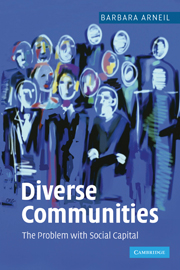Book contents
- Frontmatter
- Contents
- List of abbreviations
- Acknowledgements
- 1 Social capital, justice and diversity: an introduction
- 2 The Progressive Era: past paradise?
- 3 The present malaise in civic participation: empirical and normative dimensions
- 4 The causes of ‘decline’ in social capital theory
- 5 Civic trust and shared norms
- 6 Beyond Bowling Alone: social capital in twenty-first-century America
- 7 Justice in diverse communities: lessons for the future
- References
- Index
2 - The Progressive Era: past paradise?
Published online by Cambridge University Press: 22 September 2009
- Frontmatter
- Contents
- List of abbreviations
- Acknowledgements
- 1 Social capital, justice and diversity: an introduction
- 2 The Progressive Era: past paradise?
- 3 The present malaise in civic participation: empirical and normative dimensions
- 4 The causes of ‘decline’ in social capital theory
- 5 Civic trust and shared norms
- 6 Beyond Bowling Alone: social capital in twenty-first-century America
- 7 Justice in diverse communities: lessons for the future
- References
- Index
Summary
In the penultimate chapter of Bowling Alone, Robert Putnam makes the case that the Progressive Era, a society he considers to be replete with social capital, provides a largely positive model of social connectedness. This chapter is important, therefore, not only for a historical account of the origins of social capital in twentieth-century America, but as a prototype for the future. As Putnam comments when asked why he expanded his original article to a full-length book: ‘The deep parallels between our current predicament and the problems facing America at the end of the Gilded Age had not occurred to me when I wrote the article, and I had not begun to think about how to “fix” the problem.’ If the transition from the Gilded Age to the Progressive Era is to be used as a model for ‘fixing’ current problems, one must be extremely careful to understand the nature of the ‘community’ of this historical era, including both its negative and positive features.
The first three sections of this chapter are an analysis of the civic associations that emerged during this period and the projects in which they were engaged. Both are critical to analysing how social capital was accumulated in the Progressive Era, as well as the impact on those defined as ‘outside’ the American community and its mainstream organizations. Putnam's focus on the positive side of these projects, in relationship to economic amelioration, will be countered in this chapter by a different, more negative, side to the story.
- Type
- Chapter
- Information
- Diverse CommunitiesThe Problem with Social Capital, pp. 15 - 40Publisher: Cambridge University PressPrint publication year: 2006



